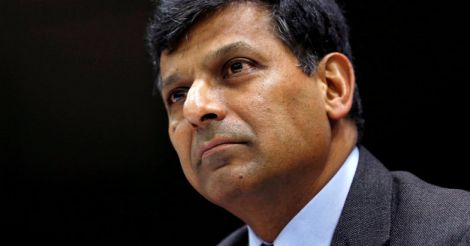September 4 is still two and half months away. Yet, there is anticipation in government and financial circles on what would Raghuram Rajan say on the Indian economy, and effects of demonetization on that day, when it will be one year since he left the governorship of the Reserve Bank of India (RBI).
The reputed economist, who had a turbulent relationship with Narendra Modi's government, has avoided making any major comments on the government or the Reserve Bank, where he was succeeded by Urjit Patel.
Two months after he left office, the prime minister stunned the nation by his announcement to withdraw 86 percent of the notes, leaving Patel and the banks to handle the massiv
Rajan, who was more like a rockstar with his comments on both financial and non-financial matters during his three-year term as the governor, has been present in the economy through his silence.
He returned to teaching in the United States of America and had been under indirect attack for not supporting the government's demand for reduction of interest rates.
There was also direct attack by BJP firebrand MP Subramanian Swamy, who said Rajan did not understand Indian ethos and had ruined the banking industry. But Arun Jaitley, who has a running battle with Swamy, had defended Rajan, who advocated sound policies for management of economy and was critical of some government policies.
Rajan himself has not said when he will open his mouth again, but he had hinted to friends that Patel should be given time to steer the monetary policy without immediate sniping and commenting by the predecessor. It is felt that Rajan might feel free from this sense of obligation after one year, to air his thoughts.
Normally, Rajan has used public speeches, whether given at industry meetings or in educational institutions, for his direct comments. Rajan has also not reacted to speculation that he is busy finishing a book on his period in India, and that it would contain his comments on demonetization and the financial policies of the NDA government.
But Patel, who was more accommodative to the demands of the government, has however sprung a surprise by refusing to reduce the bank interest rates. He has gone along with the newly constituted monetary policy committee with three members from the RBI and three experts nominated by the government.
Interestingly, only one of the government differed with Patel, who felt inflation, though on a downward trend, still needs watching and the country cannot afford a cut in interest rates, which would make money available for lending by banks.
The committee refused a meeting with chief economic adviser Arvind Subramanian and finance ministry officials before deciding on retention of interest rates.
Subramanian, whose term expires later this year, has fumed and fretted that the reserve bank has been making big blunders on interest rates. He is frustrated that the bank is too conservative and orthodox under Patel, unlike it was under D. Subbarao and Rajan (both appointees of Manmohan Singh).
But senior bureaucrats in the finance ministry, who have their own differences with the aggressive Subramanian, say that he has not consulted the finance minister before criticising the Reserve Bank.
Patel has however been meeting senior officials in prime minister's office, banking department and even the cabinet secretary to discuss issues relating to reforming the badly battered public sector banks, which have more than five lakh crore as bad loans. Unlike Rajan, Patel has allowed his decisions to speak for themselves and avoided making any general comments on the economy.
Yet, he is also waiting for the first public remarks of his predecessor.

























 Former RBI governor Raghuram Rajan (file photo)
Former RBI governor Raghuram Rajan (file photo)